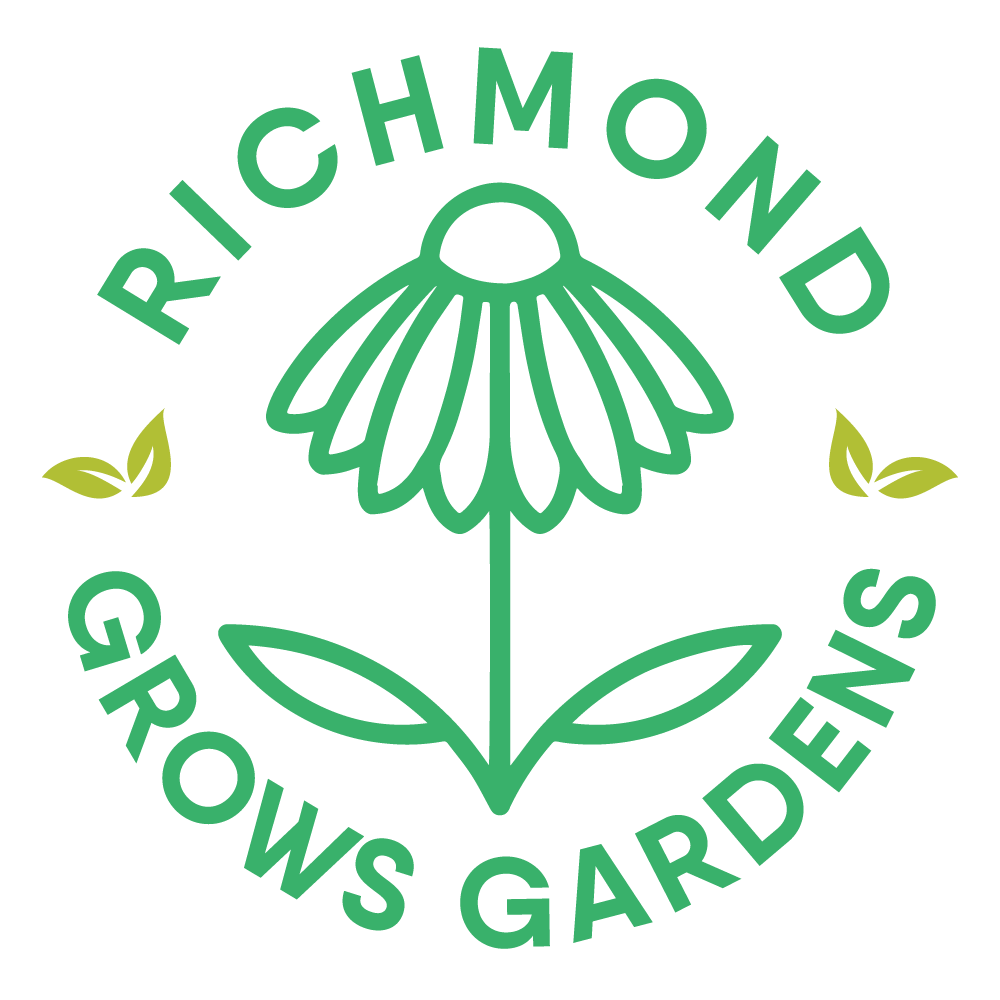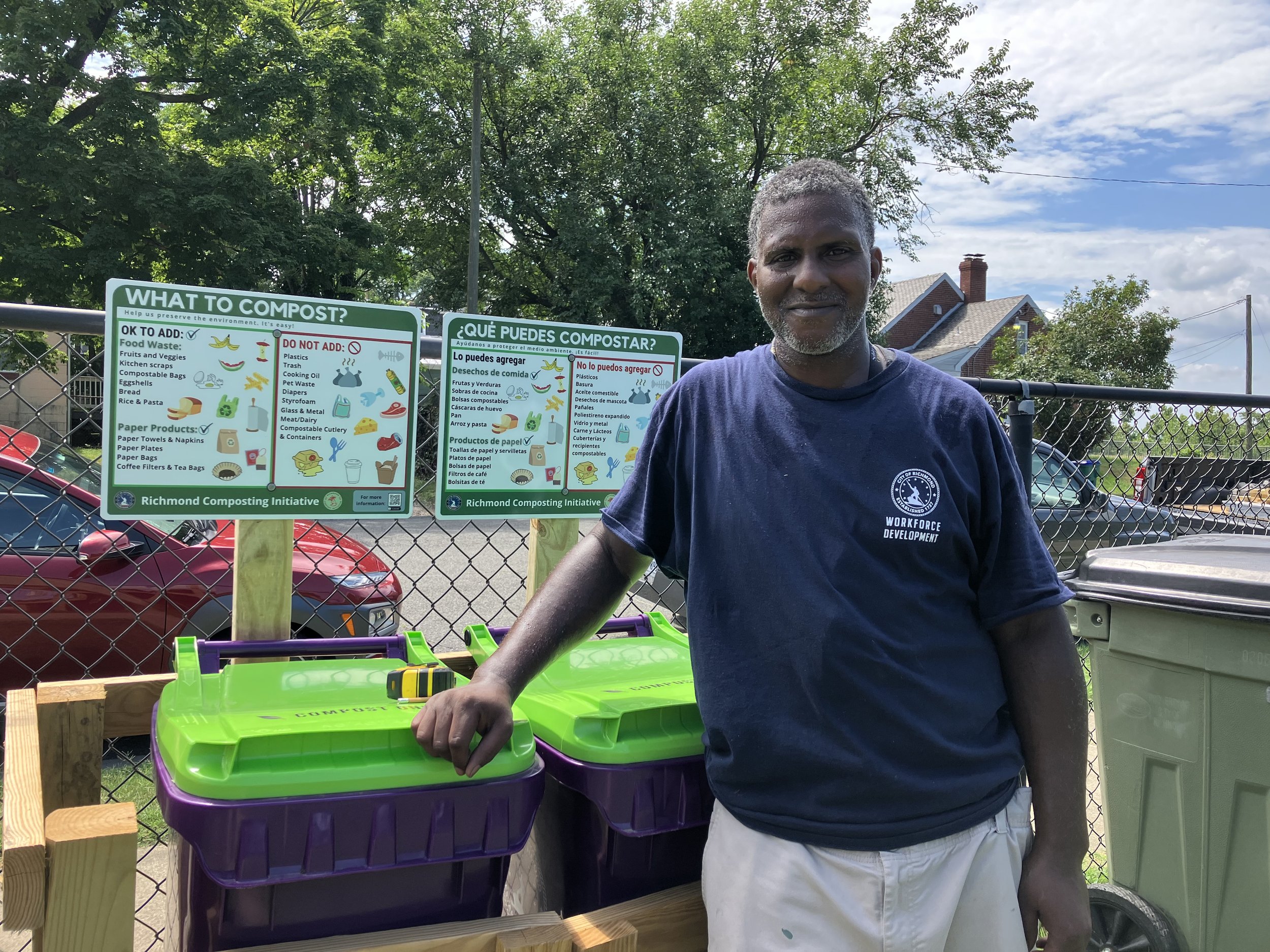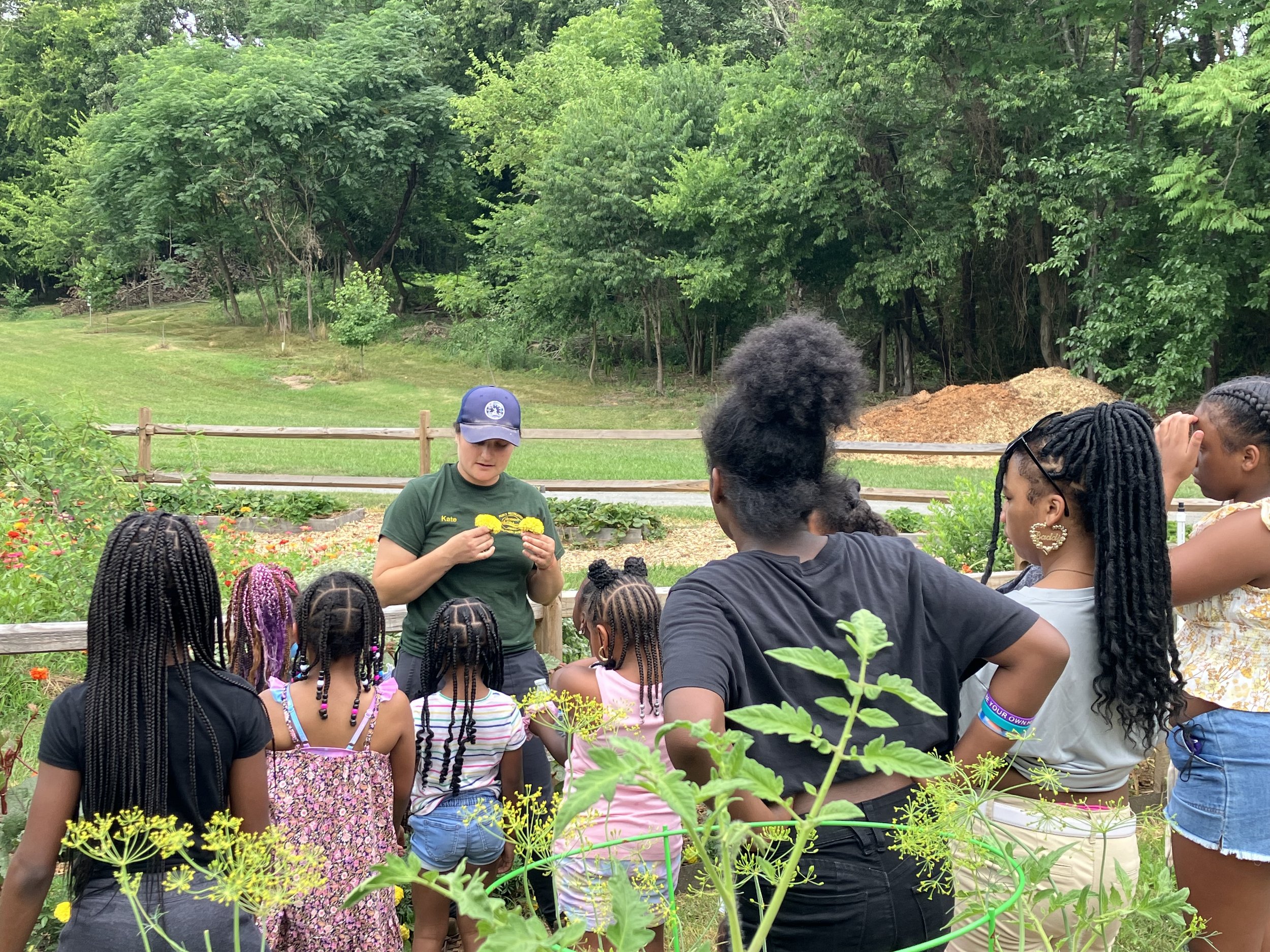The Dirt on Richmond Compost Initiative
Richmond Grows Gardens is thrilled to announce that we are the recipient of a $90,000 grant from the USDA Natural Resources Conservation Service, enabling us to pilot a citywide community composting program. The Richmond Compost Initiative officially launched July 2022, and is currently funded through early Fall 2023. If you frequent the library or your local community garden, you may have already noticed the bright purple bins topped with lime-green lids popping up at either location, inscribed on top with the words “Compost Only.”
Two of RCI’s bins side by side outside of Chimborazo Community Garden
A close up of the tops of the loudly lime-green and purple bins, reading “Compost Only”
These bins will serve as the receptacles in which organic matter will be collected weekly for processing at a central site. Once the organic matter is processed on site and transformed into high quality compost, it will be redistributed to the city’s community gardens and green spaces for use.
What is Compost?
Composting is nature’s way of recycling. It is the process by which the parts of food we commonly regard and discard as waste, such as potato peels, carrot tops, and watermelon rinds, are instead reused and turned into rich, usable, nutrient-dense soil - otherwise known as compost. It is so singularly potent and soil-enriching that gardeners have come to affectionately refer to it as black gold.
Compost is produced from a deliberate mix of carbon (or “browns;” think leaves) and nitrogen (or “greens;” think food waste.) Traditionally, the compost recipe calls for about a 4:1 ratio of browns to greens. Once these are strategically layered together and aerated, they are then left to “cook” - creating a prime environment to feed the microorganisms and fungi that will ultimately break it down into usable black gold.
Essentially, composting is applied chemistry the way architecture is applied geometry. For those paying attention, this chemistry-made-tangible holds a lesson on rebirth in real time.
Why Compost?
Composting is a sustainable, zero-waste, practical solution to many of the environmental problems plaguing us today. It diverts food waste from the landfill while creating a product that can service the community - creating a closed loop that results in stronger soil and builds a more resilient local food system.
A common misconception is that adding organic matter to trash is fine because it will ultimately break down - however, while this is technically true, it’s certainly not fine. Due to the fact that a landfill creates such an unnatural environment, organic matter in trash, subsequently robbed of microorganisms and adequate oxygen, produces methane gas as it breaks down, a greenhouse gas more potent than carbon dioxide. As a staggering 30% of all food currently produced on Earth is wasted, this quickly adds up to a hefty problem.
Richmond Compost Initiative’s logo, designed by Richmond Grows Gardens’ former AmeriCorps member and resident artist Ellanor Milkowski Dahlgren (@ellanor_apple.core)
Food scraps also contain valuable nutrients that should be reabsorbed into our soil instead of discarded. In America, fifty years of an industrialized farming practice, focused on production rather than sustainability, has resulted in a soil so depleted that the nutrient density of our food has actually measurably decreased.
Composting not only mitigates waste, it is regenerative. Having a municipal compost option through the Richmond Compost Initiative will allow more people access to participating in and benefiting from this practice. For those who are already composting, it allows an opportunity to contribute to a shared effort that will yield larger and faster results than individual efforts are able. Having it processed locally also means less fossil fuels will be used in both its collection and decimation. Collectively, this is an important step in progressing towards the city’s sustainability goals as outlined in the RVAGreen 2050 plan, slated for adoption by city council later this year.
What can be Composted?
As previously mentioned, composting is simply the decomposition process made scientific, and thus is made by strategically layering browns and greens.
All of the following can be composted:
Browns:
Cardboard
Shredded Paper
Paper Bags
Compostable Bags
Straw
Leaves
Greens:
Vegetable and Fruit “Waste”/Excess
Coffee Grounds and Filters
Tea Bags
Egg Shells
Rice and Pasta (either cooked or uncooked)
Bread
Grass Clippings
Any of the above can be bagged in a biodegradable bag and deposited, or emptied directly from your household compost container and deposited to the compost receptacle most local to you, out of the nearly twenty drop off locations that can be found throughout the city, housed at libraries, community gardens, and some community centers.
James, a member of Richmond’s Workforce Development Program, poses with the informational signs posted above RCI’s bins. These signs accompany the bins at each drop off location.
What can’t be Composted?
While industrial scale compost facilities are able to accept containers and cutlery marketed as compostable, Richmond Compost Intiative is not currently at a scale that has the ability to process either effectively - unless the packaging denotes it as compostable at home. For now, food scraps that have been cooked in oil or containing dairy or meat should also be kept out of the RCI bins. Items like plastics, metal, glass, and pet waste should also be avoided.
If ever in doubt or unsure, a good rule of thumb to follow is “if it didn’t grow, it can’t go!” Erring on the side of caution is best to avoid attracting pests.
The Faces Behind Richmond Compost Initiative
Richmond is a recipient of this grant due in large part to the tireless efforts and advocacy of Kate Rivara, Richmond’s current Community Garden Coordinator through the Department of Parks and Recreation, and a devoted public servant. While the City of Richmond is just now seeing her vision come to life, enfleshed in bins of bright purple and green, these eye-catching receptacles reflect hours of behind-the-scenes work and organization midwifeing Richmond Compost Initiative into being.
Kate is a longtime personal gardener and composter herself, and the knowledge accumulated in those years - during that labor of love - continues to inform her in her position today. Her backyard is a mess of native plants and vegetables, a haven for both her and pollinators. She remains both moved and inspired by the imagery held in compost - life from death. This metaphor is particularly poignant against the context of a job that can at times be thankless, where change can come as imperceptibly as the microorganisms in compost, and as incrementally as the composting “cooking” process. Still, Kate is resolved in the “discipline of hope,” as Mariame Kaba calls it, and remains unflagging in her quest to see the city she loves become a more sustainable one. Richmond Compost Initiative was borne from this resolve.
Kate, a former Richmond city teacher, captured in her element teaching a group of local youth about marigolds and the benefits of companionship gardening at Bellemeade Community Garden.
Even the process of securing the grant from the USDA for the Compost Initiative is a reflection of Kate’s tenacity and humility. She first applied for the grant in 2020, and her application was denied. Disappointed but undeterred, she followed up with the USDA grant committee and requested feedback on the reasons why her application was denied. They graciously responded, citing its weaknesses. The following year, she applied for the grant again, having edited in response to their criticisms, and her petition was accepted. Subsequently, Richmond Compost Initiative was born.
Real Roots Food Systems, a Richmond-based production farm run by Mark Davis, has been contracted as the compost site manager. Mark comes into this position with a passion for connecting people to their land by teaching them to be involved in their food system in whatever ways are accessible to them. Composting provides one such access point, meaning Richmond Compost Initiative aligns with the existing educational goals of the farm. The Department of Public Works is also supporting the composting pilot in the form of providing personnel, equipment, and the East End site where the food scraps will be processed into high-quality compost by Real Roots.
Mark Davis of RealRoots Food Systems discusses the construction of the vermicompost bin (pictured) with JaQuan Terry, a participant in PRCF’s TRIP (Teens of Richmond In Parks) program this summer.
Mark Davis works alongside Shane, a member of Richmond Grows Gardens 2022 AmeriCorps’ summer team, and Travis Scott, a member of Richmond’s Workforce Development program, to process compost.
Most people cite the beauty of the stars when it comes to engaging with amazement at the brilliance of the world in which we live - but you can just as easily look to the dirt. In one handful of soil, there are likely more bacteria therein than there are people currently populating this planet. Richmond Compost Initiative is a call to awe, an invitation to marvel at the forces that connect and ground us, both seen and unseen. It’s an opportunity to not only see but be a force of good locally.








